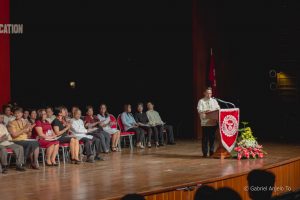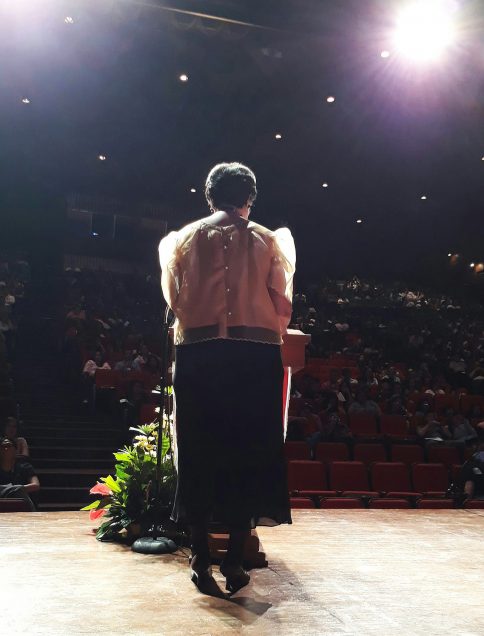
SU adopts new environmental policy
 One immediate focus of Silliman University starting this semester is to improve on-campus waste management, announced SU president Betty Cernol-McCann during the All-University Academic Convocation on November 19.
One immediate focus of Silliman University starting this semester is to improve on-campus waste management, announced SU president Betty Cernol-McCann during the All-University Academic Convocation on November 19.
The University has adopted a new environmental policy framework consisting of Environmental Principles, Policies, Guidelines, and Best Practices that will be implemented by its faculty, staff, and students as well as by concessionaires, booth operators, event organizers, sponsors, and visitors.
SU commits to apply the Environmental Principles in five specific policy areas: General Policies on Waste Prevention and Waste Management, including Zero Waste management; Green Procurement Policies; Policies Related to Food and Food Waste; Waste Policies Related to Events and Festivals; and Policies Related to Greening of the Campus.
 Dr. McCann said the practice of proper waste management in the University is effective immediately. Following this, all biodegradable wastes from the campus will be composted with the assistance of the College of Agriculture. Meanwhile, reuse and recycling of all recyclable waste will be maximized.
Dr. McCann said the practice of proper waste management in the University is effective immediately. Following this, all biodegradable wastes from the campus will be composted with the assistance of the College of Agriculture. Meanwhile, reuse and recycling of all recyclable waste will be maximized.
“Henceforth, all trash cans will be properly labeled and faculty, staff, and students will be asked to segregate waste accordingly. Please cooperate with the Waste Management Committee and volunteers who will visit each building to label bins and provide instructions on segregation,” said Dr. McCann.
Another immediate focus of the University is to minimize plastic waste. A consistent media campaign and Information, Education and Communication strategy will be employed to disseminate information on the policies and guidelines associated with this objective.
“We will intensify our drive against one-use plastics and prohibit bringing to campus containers and wrappers that contribute heavily to waste pollution,” Dr. McCann added.
The Guidelines and Best Practices stated in the framework, said Dr. McCann, will be implemented in ten operations of the university: at Buildings & Grounds, Academic Departments, Administrative and Support Service Units, Student Affairs, Student Government, Student and Faculty Housing and Residences, Food Services, College of Agriculture, Elementary and High School Departments, and the Office of Information and Publications.
According to the guidelines, department chairs and unit heads shall be the main persons responsible for ensuring compliance with these policies in their respective departments or units. Dr. McCann encouraged Sillimanians to send their questions or suggestions on the environmental policy framework to the Waste Management Committee coordinated by her office.
The Board of Trustees (BOT), at its meeting last November 17, adopted in full the policy paper developed by a team led by Dr. Jorge Emmanuel, Adjunct Professor at the Institute of Environmental and Marine Sciences (IEMS) and a Balik Scientist under the Department of Science and Technology program.
“You will realize then that for the first University-wide project, going into zero waste management actually means 100 percent university engagement,” said Dr. McCann.
Morover, she said, SU’s environmental commitment encompasses activities in teaching, research, service, worship and fellowship, culture and sports, outreach, planning and development, administration, and operations.
Students, faculty, staff, and administrators attended the convocation that marked the opening of the second semester of Academic Year 2018-2019. The convocation is a University tradition to orient and inspire newcomers toward its vision and mission as a leading Christian institution committed to total human development for the well-being of society and environment, as well as to share with them the values that have shaped the university through the decades.

Photo by Atty. Joshua Ablong
Dr. McCann encouraged Sillimanians to send their questions or suggestions on the environmental policy framework to the Waste Management Committee coordinated by her office. Click here to read the full text of the SU Environmental Principles, Policies, Guidelines, and Best Practices.


